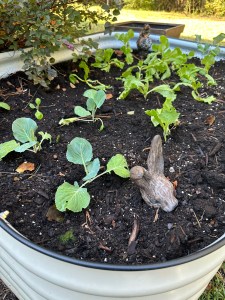“I wish I could listen to him again. I wish I had listened to her more.”
I’ve been thinking those two thoughts a lot lately, inspired by an aphorism that I came across while reading John T. Edge’s recently published memoir “House of Smoke.”
Hands down, Edge’s memoir was one of my favorite reads this year, exploring, to steal a lyric from the Drive-By Truckers, “the duality of the Southern thing,” and so much more. As a lifelong Mississippian, the book has me thinking even more about what growing up as a boy in the South meant, and what it means.
I thought about my grandmother while planting our small fall garden last weekend. I thought about all the things that I learned from her as a boy and all the things that I wish that I had learned from her before she was gone. Photo by Brad Dye
Edge’s writing and personal story resonate with truths like this: “Mississippi is hard on a soul. Mississippi is just plain hard for many. It’s a broken place in the slow and fitful act of mending. That’s why it feels like home.”
I’ve long felt that my first book should be a memoir. In truth, that’s what most of this column has been over these past six years. Edge’s words about home and going home gave me an even stronger nudge toward what I feel that I need to write.
Describing his own personal homecoming, Edge says that “…I thought about the price men pay when we go back home with new ideas about our past.” Since reading those words, I’ve had that thought in mind each time that I sit down at my writing desk. I can’t let it go.
Newsletter sign up WIDGET
Email newsletter signup
I’ve also thought a lot about an aphorism quoted by Bill Ferris in the book “When an old man dies, a library burns to the ground.” I don’t know how I managed to miss this African proverb over the years, but I’ve pondered it daily since reading it.
Sunday morning as I sat outside drinking my morning coffee and enjoying the brisk wind that was ushering in a fall cold front, I considered how many times I had sat on the same dirt listening to Pop tell stories.
Before the farm was our home, it was our hunting and fishing camp for many years. “The Little House,” (now Nana’s house) and “The Big House” (now our house) served as our family camp houses for every season—duck, deer, turkey, squirrel and rabbit.
The houses also played host for family holidays like Thanksgiving, as well as getaway spots for spring breaks and other school holidays when the kids were small. They still often play host to those family holiday events, only now as our homes.
Sitting there Sunday, all the things that Pop had taught me about deer, duck and turkey hunting, and, more importantly, about how to be a husband and a father ran through my mind. I wish that I could listen to him tell those stories again.
The morning prior, I had a similar “wish” as I harvested the last of my tomatoes and bell peppers, cleaned out those vines and plants, and transitioned our small summer garden to fall. After turning the soil, removing the old roots, and mixing in fresh compost, I arranged cabbage, lettuce and collards in the raised bed.
Afterwards as I stood to admire my handiwork, I pictured my grandmother’s garden. I spent a lot of time in that garden during my visits to Mamaw Jewel’s as a boy, and fall was always my favorite.
I loved the smell of the soil on a cool evening and the smell of fresh picked greens and turnips. I loved those smells almost as much as I loved the smell of the greens cooking on Mamaw’s stove. However, all these smells paled in comparison to the taste of the greens and her freshly buttered cornbread.
Watching her cook was like watching an artist at work, an artist who worked in the mediums of cast iron and lard. Although I suppose that I was too young at the time to concern myself with learning those recipes, I sure wish that I had. I wish I had watched her and listened more closely.
When we moved to the farm, we found several kitchen “treasures” from prior generations, treasures that included two cast iron skillets from G’s grandmother Frances and a wooden rolling pin from her great-grandmother “Mama Hull.”
I love using those skillets, feeling their well-seasoned patina and knowing they belonged to our family. I wish that cast iron could talk. I wish it could reveal the ingredients and secrets of past family recipes. I wish that G’s grandmother Mimi’s skillet, now in Nana’s kitchen at the Little House, could tell me just how she fried her chicken, no doubt the best I’ve ever had.
Sadly, the combination of the flour, spices and herbs that she used, and her techniques and methods will remain a mystery. Cast iron skillets can’t talk, though they can certainly pass along a little seasoning from the past.
I’ll always treasure the skillets, as well as the hands that used them; and I’ll always live with the regret that I didn’t take more time to listen and learn from the “libraries” in my life while they were alive. Time truly is our greatest treasure and our most valuable currency, however, that realization only comes with time’s passing.
Thomas Wolfe, who wrote “You Can’t Go Home Again,” took his inspiration from writer Ella Winter who had once told him, “Don’t you know you can’t go home again?”
I understand the sentiment, however, Edge’s book reinforced within me the notion that you can return home, and in that coming and going, you are forever changed.
Until next time, here’s to collard greens fresh from a fall garden, to cornbread fresh from a cast iron skillet, to the men and women, the Pops and Mamaws, who shaped us into who we are, and here’s to seeing you out there in our great outdoors.


